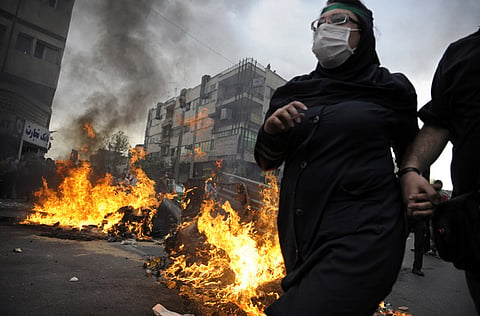Iran's Guards warn opposition on vote anniversary
Iranian authorities vow to crack down on any new protest against the government

Tehran: Iran's Revolutionary Guards warned the opposition on Saturday, the first anniversary of a disputed presidential election, that they would crack down on any attempts to create a "security crisis."
Authorities had banned an opposition rally planned for Saturday, and reformist leaders had told their supporters to stay home, fearing for people's lives in any crackdown.
"Any revival of street protests is unlikely. But if the sedition movement creates a security crisis, we will confront them with full force," said senior Guards commander Reza Farzaneh, according to the Javan newspaper.
Last year's post-election street protests, the worst unrest since the Islamic republic was founded in 1979, were put down violently by the Guards. Mass detentions and trials followed. Two people were hanged and scores of detainees remain in jail.
In Washington, US Secretary of State Hillary Clinton issued a statement citing the Iranian government's "denial of the fundamental freedoms" to its citizens and calling for the release of jailed dissidents.
There was a heavy security presence on Tehran's squares and some opposition websites reported sporadic clashes between security forces and opposition supporters in various parts of Tehran, including inside two university campuses.
"Security forces dispersed a few dozen demonstrators in a southern Tehran square. They were pushing people," a witness told Reuters. "They detained three protestors."
A senior police official denied reports of clashes.
"There were no clashes around the country ... only a few suspicious people were detained by security agents," the semi- official Fars news agency quoted Mohammadreza Radan as saying.
Cries of "Allahu Akbar" (God is Greatest) were heard from rooftops, a move urged by opposition figures in exile.
The opposition says the vote was rigged to secure the re-election of the hardline president, Mahmoud Ahmadinejad.
The authorities deny the accusations, saying they are part of a Western plot to overthrow the Islamic system, and have repeatedly said they will prevent any revival of the protests.
Many Iranians critical of the government now seem unwilling to risk violence or arrest with displays of dissent, and doubts have grown over the effectiveness of the reformists' leaders.
"What have the opposition leaders been able to do for my friends who are still in jail?" said Mohammad Sefati, a 25-year-old literature student in the city of Mashhad.
"I am a backer of the reform movement. But what can we do without any leadership?"
More arrests
Defeated presidential candidate Mir Hussain Mousavi said the movement is alive, but his campaign is fading as many Iranians feel the former prime minister lacks the political courage to confront the establishment from which he sprang.
At least a dozen pro-reform publications and most opposition websites have been blocked since the vote, making it hard for the opposition leaders to communicate with the public.
Mousavi has called on his supporters to use peaceful methods to confront the government, including using websites.
"We should focus on expanding social networks and websites ... which work like an army. This is our army against their military force," his Kaleme website reported Mousavi as saying.
The last major opposition protest in December led to clashes with security forces in which eight demonstrators were killed.
Since last week, the government has intensified its clampdown, arresting dozens of activists, journalists and students.
Narges Mohamadi, a close aide to Iran's 2003 Nobel Peace Prize winner Shirin Ebadi, was arrested on Thursday, Ebadi's Defenders of Human Rights Center said.
In her statement, Clinton called for "the immediate release of all imprisoned human rights defenders" in Iran, specifically naming Mohamadi along with six other dissidents.
The United States said on Friday it was working to persuade members of the UN Human Rights Council to voice solidarity with the victims of the post-vote violence and repression.
On Wednesday, the UN Security Council passed a fourth set of sanctions intended to curb Iran's nuclear programme, which the West fears is a cover for nuclear weapons development.
Iran, the world's fifth largest crude oil exporter, insists it needs nuclear technology to generate power.
Authorities have been trying to reassure Iranians that the new sanctions will have no more impact than previous ones, which have failed to cripple the economy. Ordinary Iranians seem more concerned about low salaries, high inflation and increasing unemployment.



